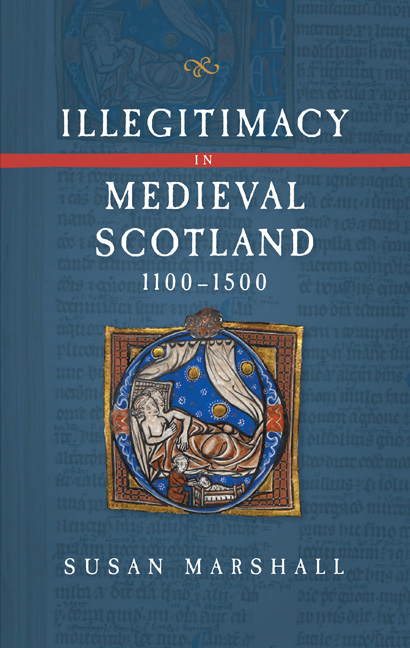Book contents
- Frontmatter
- Dedication
- Contents
- List of Tables
- Preface
- Acknowledgements
- Abbreviations
- Introduction
- 1 Church law and Scottish Families
- 2 Illegitimacy and Inheritance
- 3 Illegitimacy and Royal Succession I: Before the Great Cause
- 4 Illegitimacy and Royal Succession II: from the Great Cause to James I
- 5 Wives, Daughters, and Sisters
- 6 Church Careers and Sacrilegious Bastards
- 7 Illegitimacy in Political Life
- Conclusion
- Appendix I Scottish kings and their illegitimate offspring
- Appendix II Illegitimate sons of Scottish kings
- Timeline of key events
- Bibliography
- Index
6 - Church Careers and Sacrilegious Bastards
Published online by Cambridge University Press: 26 March 2021
- Frontmatter
- Dedication
- Contents
- List of Tables
- Preface
- Acknowledgements
- Abbreviations
- Introduction
- 1 Church law and Scottish Families
- 2 Illegitimacy and Inheritance
- 3 Illegitimacy and Royal Succession I: Before the Great Cause
- 4 Illegitimacy and Royal Succession II: from the Great Cause to James I
- 5 Wives, Daughters, and Sisters
- 6 Church Careers and Sacrilegious Bastards
- 7 Illegitimacy in Political Life
- Conclusion
- Appendix I Scottish kings and their illegitimate offspring
- Appendix II Illegitimate sons of Scottish kings
- Timeline of key events
- Bibliography
- Index
Summary
Quha suld me wyte alsua, sen I na ma
Change my birth, nor put my weird away?
From the eleventh century, illegitimacy began to be seen as an ‘irregularity’ in respect of holy orders, and during the twelfth it became an impediment to ordination and to the exercise of sacred ministries. Irregularities to ecclesiastical orders fell into two categories: those ‘by delict’ debarred the subject from ordination because of a personal fault, such as commission of a crime, making the person unworthy to be ordained, while those excluded ‘by defect’ may have committed no wrong but were in a condition held to be incongruous with the exercise of the sacred ministry. Illegitimacy – defectus natalium (‘defect of birth’) – was in this latter category. Irregularities of either kind could be remedied by means of a dispensation issued by a competent authority, but these were always discretionary. Illegitimates embarking on a clerical career were required to obtain a dispensation de (or ex) defectu natalium prior to ordination, while those who were ordained and sought to hold multiple benefices or to progress to a higher office in the Church needed a de uberiori (‘more abundant’) dispensation permitting this. The third type of dispensation specifically for illegitimates was the ubi pater (‘where the father is’), which enabled an illegitimate person to minister in the same clerical institution as their parent had served or was serving. The majority of illegitimate people in monastic life, rather than in the secular clergy, had no need of a dispensation, which was required only if a monk or a nun sought a position of authority in the convent.
The requirement for illegitimates seeking a Church career to be dispensed ex defectu natalium seems not to have been known in the early Church. In 845– 6 the Council of Meaux-Paris denied all illegitimates the right to hold Church offices, but this was a provincial synod and its canons were not binding on the whole Church. The purity of the ordained clergy may have been the Church's primary concern, but part of the impetus for the later creation of defectus natalium came from a desire to stem the tide of priests’ offspring claiming rights of inheritance over clerical offices or property.
- Type
- Chapter
- Information
- Illegitimacy in Medieval Scotland1100-1500, pp. 149 - 172Publisher: Boydell & BrewerPrint publication year: 2021

